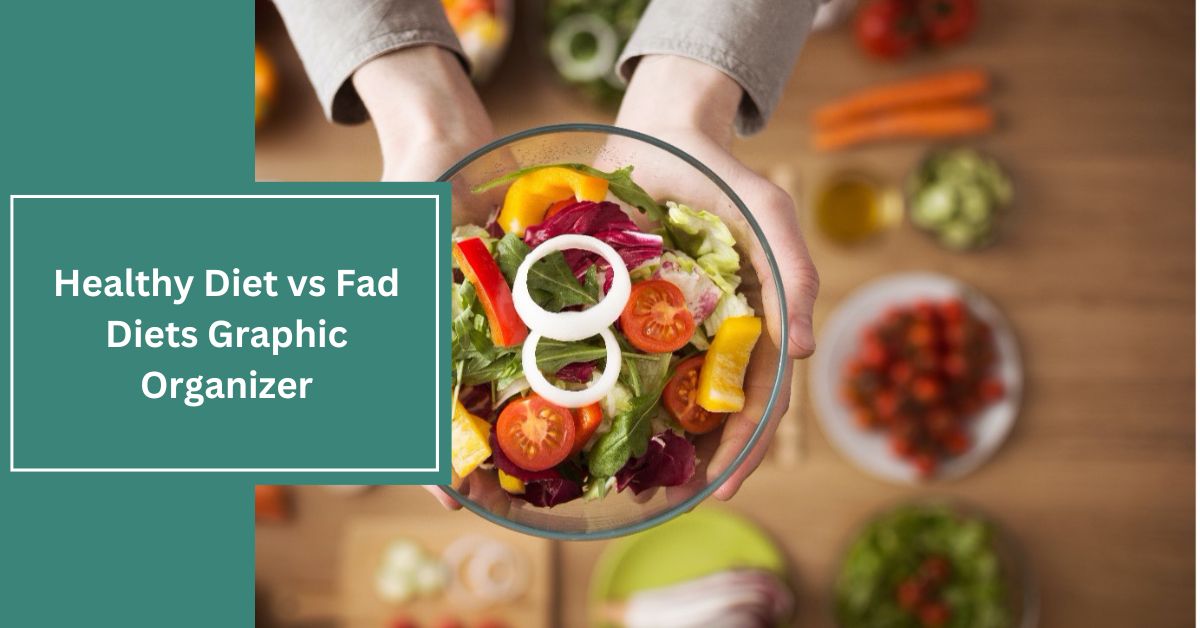In today’s fast-paced world, individuals often turn to diets to achieve quick weight loss or improved health. While the idea of shedding pounds rapidly is tempting, it’s essential to distinguish between a healthy diet and fad diets.
This article delves into these concepts, providing insights through a healthy diet vs fad diets graphic organizer to guide readers toward informed decisions.
What is a Healthy Diet?
A healthy diet is a sustainable, balanced eating pattern that emphasizes the consumption of nutrient-rich foods. It focuses on:
- Variety: Incorporating fruits, vegetables, whole grains, proteins, and healthy fats.
- Moderation: Avoiding overconsumption of any single food group.
- Consistency: Adopting long-term habits rather than temporary fixes.
Healthy eating habits promote physical and mental well-being, providing the body with the nutrients it needs for energy, immunity, and overall function.
What are Fad Diets?
Fad diets, in contrast, are often marketed as quick solutions to weight loss. These diets typically:
- Promise dramatic results in a short time.
- Exclude or overly restrict certain food groups.
- Lack scientific backing or long-term effectiveness.
Examples include the Atkins diet, juice cleanses, or keto extremes. While some may see temporary weight loss, fad diets often fail to offer sustainable results and can lead to nutritional deficiencies.
Key Differences: Healthy Diet vs Fad Diets
To better understand, a healthy diet vs fad diets graphic organizer can be a helpful tool:
| Aspect | Healthy Diet | Fad Diets |
| Duration | Lifelong | Short-term |
| Focus | Balanced nutrition | Rapid weight loss |
| Approach | Moderation and variety | Restriction and elimination |
| Scientific Basis | Backed by research | Often lacks scientific support |
| Sustainability | Easy to maintain over time | Difficult to adhere to long-term |
Why Fad Diets Can Be Harmful?
Fad diets might seem appealing due to their bold promises, but they come with potential risks:
- Nutritional Deficiencies: By excluding essential food groups, the body may miss out on vital nutrients.
- Yo-Yo Effect: Weight often returns after the diet ends.
- Emotional Impact: The restrictive nature can lead to frustration, guilt, or unhealthy relationships with food.
Benefits of a Healthy Diet:
Switching to a healthy diet has numerous advantages:
- Supports long-term weight management.
- Boosts energy and mood.
- Reduces the risk of chronic diseases like diabetes, heart disease, and obesity.
- Encourages a positive relationship with food.
How to Transition to a Healthy Diet?
- Start Small: Make gradual changes, like incorporating more vegetables or reducing sugary drinks.
- Plan Meals: Create a balanced meal plan with a variety of food groups.
- Seek Support: Work with a nutritionist or use a healthy diet vs fad diets graphic organizer to map your progress.
- Stay Educated: Learn about nutrition to make informed choices.
Cultural and Psychological Impacts of Diet Choices:
Diet choices often extend beyond physical health, influencing cultural and psychological well-being. A healthy diet typically aligns with cultural traditions and fosters a positive connection with food.
For instance, sharing balanced meals with family promotes emotional bonding and respect for traditional culinary practices. Conversely, fad diets can disrupt these relationships by creating a rigid and restrictive approach to eating.
Social gatherings and cultural celebrations may become stressful for individuals adhering to fad diets, as these often exclude foods essential to such events. Over time, this disconnect can lead to feelings of isolation and a strained relationship with one’s culture and social environment.
Economic Considerations – Cost of Healthy Diets vs. Fad Diets!
Another critical aspect is the economic impact of diet choices. Healthy diets can be cost-effective when centered around whole, minimally processed foods such as grains, legumes, and seasonal produce. These items are not only nutritious but also affordable and widely available.
In contrast, many fad diets rely on specialty products, supplements, or specific meal plans, which can be expensive. The financial strain of maintaining these diets may deter individuals from sustaining them over time. Understanding the economic feasibility of a diet is crucial for creating lasting habits that do not add unnecessary financial stress.
Impact on Physical Performance and Energy Levels:
Healthy diets provide consistent and adequate energy, which is vital for physical performance and daily activities. They support endurance, strength, and mental clarity by supplying the body with a balanced mix of macronutrients and micronutrients.
Athletes, for example, rely on diverse and nutrient-dense diets to optimize their training and recovery. On the other hand, fad diets often lack essential nutrients like carbohydrates or healthy fats, leading to fatigue, muscle loss, and diminished physical performance. These energy deficits can hinder productivity, reduce exercise capacity, and negatively affect long-term health.
Environmental Implications of Dietary Choices:
The environmental impact of diets is another important but often overlooked factor. Healthy diets, particularly those emphasizing plant-based foods, tend to have a smaller ecological footprint. They promote sustainable farming practices and reduce greenhouse gas emissions associated with meat-heavy or highly processed diets.
Conversely, many fad diets-especially those that rely heavily on animal products or packaged “diet” foods-can contribute to environmental degradation. By adopting a healthy, balanced diet, individuals not only improve their well-being but also make a positive contribution to the planet’s health.
Conclusion: Choose Wisely
The debate between a healthy diet and fad diets boils down to sustainability and overall well-being. By using tools like a healthy diet vs fad diets graphic organizer, individuals can visualize the advantages of choosing balanced eating habits over restrictive, temporary solutions. Embrace a healthy diet for long-term success and a happier, healthier life.

Leave a Reply